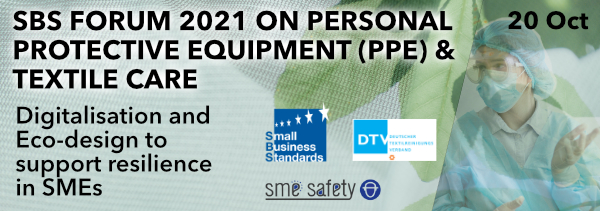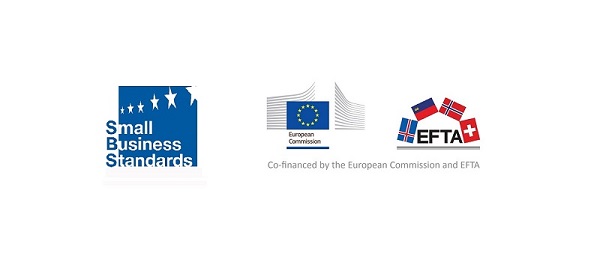October 04, 2021
SBS Forum 2021 on PPE and Textile Care Standardising Circularity in the PPE sector – Digitalisation and Eco-design to support resilience in SMEs 20 October 2021, 10:00 – 13:00 CEST [Online event]
Background
During last year, several activities and initiatives were designed on including circularity into PPE standardisation. At the EU level, two important initiatives, the Sustainable Products Initiative, and the Sustainable Textile Strategy have also addressed these issues such as Eco-design for PPE products and services and digitalisation of the sector.
With regard to digitalisation of the sector and in relation to circulatory, the Digital Product Passport initiative demonstrates the use of digitalisation and ICT standards in tracing PPE and Textile raw material to ensure transparency along the supply chain. For example, enabling technologies such as Blockchain and Distributed Ledger Technology can increase trust among the supply chain actors with accurate information regarding the source and quality of the raw materials and manufacturing processes. This would also ensure adherence to reusability, recyclability, and repairability requirements. Hence, ICT standards for the support of circularity can enable other sectors to achieve circularity goals in faster and efficient manner, as highlighted by the report on ICT Standardisation supporting Circular Economy.
Regarding eco-design, the aim should be to increase the number of usage cycles. This is possible with the help of the production of long-lasting, recyclable, and repairable products. Embedding eco-design aspects in product standards along the supply chain will therefore play a decisive role in sustainability. In order to achieve a circular economy for workwear, protective clothing or medical textiles for example, criteria and standards for a clear recognition of repairable and recyclable clothing should be available (similar to the EU energy labels). These standards would support the business models of SMEs and keep Europe much more resilient in pandemic times as well as in economic crisis and interruptions in international supply chains of linear products.
Agenda
10.00-10.10 Welcome, Maitane Olabarria Uzquiano, Director, Small Business Standards
10.10-11.10 Session 1: Digitalisation of the PPE and Textile sector – insights from policy makers
Topics for discussion:
Speakers:
Moderator: Sebastiano Toffaletti, Secretary-General, SME Safety
11.10-11.30 Q&A
11.30-12.30 Session 2: Eco-design for textiles
Topics for discussion:
Speakers:
Moderator: Andreas Schumacher, Managing Director, DTV
12.30-12.50 Q&A 12.50-13.00 Closing remarks
|
News
| SBS Webinar - Smart Textiles Standardisation Monday, November 21, 2022 |
| SBS Forum 2022 on PPE and Textile Care: Standardisation in the PPE sector – From dual to multi compliance Wednesday, October 19, 2022 |
| SBS Forum on PPE and Textile Care 2021 Monday, October 04, 2021 |

